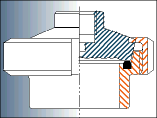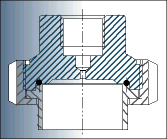
The 'sterile process technology', considering the continuously rising demands on the quality of pharmaceutical, as well as food products, is playing an ever-increasing vital role with regards to economical, safe and repeatable production processes.
The hygienic design of product-carrying plant components is critical for the prevention of microbiological contamination and thus the safeguarding of the product quality in the manufacture of pharmaceuticals, food and beverage, cosmetics and biotechnology products.
As part of the overall hygienic concept of a plant, the measuring instrumentation to be used such as pressure or temperature instruments, have to fulfil special criteria regarding material, surface quality, process safety, process connection technique as well as cleaning procedures in the framework of internationally accepted rules and regulations. Such regulations include the German 'Food and Beverage Hygienic Directive', the GMP directive, the FDA, the 3A Sanitary Standards and the directives of the EHEDG.
Materials
Standard materials for product wetted metallic parts in the sterile process technology are predominantly austenitic CrNiMo steels. In the food and beverage industry, as well as the pharmaceutical industry, the qualities of 316 L (DIN 1.4404 and 1.4435) are preferred to the Titanium stabilised 316 Ti (DIN 1.4571).
The important disadvantage of 316 TI is the very poor polishability of the material due to the separation of Titanium Carbide from the material. 316 L materials have excellent welding and corrosion-resistant properties and can be highly polished without problems.
The DIN version 1.4435, compared to 1.4404 has, a smaller ferrite content and thus better resistance to corrosion. A further improvement of the corrosive properties is the minimalisation of the Ferrite content to less than 0,5%. These steels with quality 1.4435 BN2 (after the Basler Standard) are preferred by the pharmaceutical industry in Switzerland.
Paramount for the choice of the suitable gasket material are the process parameters, pressure and temperature, the process media and the cleaning and disinfecting solvents used. Gasket materials must be non-toxic and must have sufficient stability with regard to abrasion. They must be resistant to aggressive cleaning solvents and must be stable against steam and high sterilisation temperatures. Most gasket materials in use are specially formulated Elastomer-compounds and O-rings or special seals such as PTFE, FFKM, or EPDM. The materials used for the sealing gasket and the respective production processes must be approved by authorities such as the FDA.
Material surface quality
The cleanability of a CIP/SIP process type plant is, amongst others, dependent on the quality of the material surface, which comes into contact with the process medium. To prevent build-up of pathogenic organisms, material surfaces must be passive and free of microscopic faults. For example an average value of 0,8 µm for the 'roughness' of the surface quality according to DIN 11850, is sufficient for sterile processes. Because of the strongly increasing adhesion, a value of 0,4 µm will not as a rule decrease the cleaning time of a system.
Process connection
The connection of pressure and temperature instruments to the process is ideally achieved by the use of chemical diaphragm seals and protection pockets respectively, with hygienically safe connections. Chemical seals separate the instrument from the media and guarantee instrumentation that is 'dead volume' free or with minimised dead volume. Hydrostatic pressure transmission from the Chemical Seal is direct to the instrument and can incorporate intermediate capillaries or cooling elements.
The following critical advantages are achieved by the use of chemical seals:
* 'Dead volume' - free or dead volume-minimised instrumentation suitable for high temperatures and temperature fluctuations.
* You can now measure - aggressive, corrosive, highly viscous heterogeneous, crystallising and toxic media.
* Hygienic safe process connections using laser-welded fully metallic measuring cells without any gaskets.
* Possible integration of pressure and temperature measurement with one process connection.
The principle of fully metallic measuring cells in chemical seals eliminates the need for any additional gaskets which is contrary to the ceramic cell principle. This reduces down time and service time greatly.
Ceramic measuring cells are also sensitive to dynamic stresses. Sudden pressure peaks, for example, cannot be compensated for by the ceramic cell and damage cannot be ruled out.
Principally there are two designs of chemical seals:
* Membrane seal and in-line seal
In-line seals are particularly suitable for the measurement of flowing and highly viscous media. The in-line seals are fully integrated in the process line and no troublesome turbulence, edges, dead volumes and other resistances can occur. The in-line seal is directly mounted, eliminating the need of additional costly process connections. In-line seals should ideally have a circular cross section, which clearly has advantages, such as free flow of media, over any other, non-cylindrical design. A variety of nominal pipe sizes allows for the adaptation to all pipe sizes. Chemical seal transmission fluids are FDA approved fluids such as glycerine, medical white oil and others. Special alloys such as Hastelloy, Monel, Titanium or Inconel allow the use of chemical seals even in the most difficult applications (see Figures 1 and 2).
* Pipe connecting elements
Pipe connecting elements in CIP/SIP plants must not present a risk in the sterile technological aspect and thus should have the following characteristics:
# Defined pre-stressing of the gasket by metallic contact.
# Centralisation with cylindrical guide.
# Edge-free sealing of the inner pipe.
The commonly used milk pipe fitting to DIN 11851 fulfils neither of the above criteria. A certain amount of play is possible in the conical centralisation that leads to a radial movement. This in turn leads to the absorption of media fluid in the gasket, which at re-tightening of the nut can re-enter the process media flow. Milk pipe fittings to DIN 11851 are thus only suitable for plants that are dismantled for cleaning purposes.

Contrary to the above, specially designed pipe connecting elements for CIP/SIP plants, for example 'Sterile connections' from NEUMO, fulfil all aspects of hygienically safe installations.

Measuring instruments for pressure and temperature
Through respective combinations of chemical seals, mechanical and electronic pressure and temperature measuring instrumentation can be integrated in all possible plant concepts. The possible variations range from mechanical pressure gauges to electronic pressure and temperature transmitters in in-line design. A variety of output signals are available - from 4 to 20 mA, HART Protocol and Bus concepts such as Profibus. Intrinsically safe concepts to Ex ia/ib or ATEX 100a are available for zone 0 applications.
For effective and rational outside cleaning, instruments should also fulfil minimum conditions with regard to hygienic considerations of casings. Casings should ideally be of stainless steel and offer sufficient ingress protection against water and cleaning liquids. For applications in clean room technology, such as in the pharmaceutical and biotechnology industry, casings can be electro-polished to prevent particles from attaching themselves to casings.
For the measurement of the parameters pressure and temperature, instruments are now available that fulfil all demands with regard to a contamination-free manufacturing process and are certified by the responsible authorities. High quality measuring instruments are an important factor and add greatly to the economic safety and reproducibility of production processes where the final product can affect the well-being and health of the customer.
| Tel: | +27 11 621 0000 |
| Email: | [email protected] |
| www: | www.wika.co.za |
| Articles: | More information and articles about WIKA Instruments |

© Technews Publishing (Pty) Ltd | All Rights Reserved